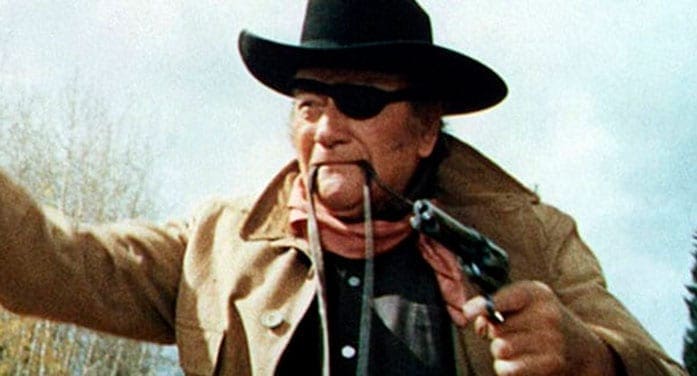 John Wayne (1907-1979) is best remembered for his western movies. And he made scads of them, ranging from mediocre to excellent.
John Wayne (1907-1979) is best remembered for his western movies. And he made scads of them, ranging from mediocre to excellent.
Indeed, three Wayne vehicles appear on the American Film Institute’s list of the top 10 westerns of all time. No other star has more than a single entry. So if any actor can be said to epitomize the genre, it’s Wayne.
Yes, some might be tempted to ascribe Wayne’s prominence to director John Ford. Ford, after all, helmed two of the three entries – The Searchers (1956) and Stagecoach (1939) – in addition to several other notable Wayne westerns.
Still, there was more to it than the influence of a single director. Here are four first-rate Wayne westerns that Ford wasn’t involved with.
Red River (1948, directed by Howard Hawks)
This is the other Wayne top 10 entry. And he wasn’t even first choice for the role.
Hawks preferred his good friend Gary Cooper. But Cooper was uncomfortable with the character’s ruthlessness and thus declined.
These reservations proved fortuitous for Wayne. Red River was a transitional film that broadened his scope and converted middle-age into an asset.
Playing the role of a mature, autocratic cattleman, Wayne was no longer what biographer Scott Eyman calls the “overgrown country boy” of his earlier movies. He was now a blend of hero and villain. Stubborn and ruthless, he was even easy to dislike.
Wayne relished the part. He was also shrewd enough to recognize its career value: “Stagecoach established me as a star; Red River established me as an actor.”
Rio Bravo (1959, directed by Howard Hawks)
Rio Bravo’s timing was good for Wayne and Hawks.
After nine consecutive years on the list of top box office draws, Wayne dropped off in 1958. And Hawks hadn’t directed since Land of the Pharaohs flopped in 1955.
They both needed another hit, which Rio Bravo delivered. It put Wayne back on the top box office draw list, where he stayed through 1974.
As westerns go, Rio Bravo is longer than usual. But it’s never boring. Film critic Roger Ebert hit the nail on the head: “It is uncommonly absorbing, and the 141-minute running time flows past like running water.”
Playing the self-reliant Sheriff John T. Chance, Wayne is in tip-top form throughout. He leaves a vivid imprint on every scene in which he appears. Quoting Ebert again, Wayne’s character “doesn’t feel it necessary to impose himself, apart from the formidable fact of his presence.”
He even credibly gets the girl, the then-unknown Angie Dickinson.
Wayne was 51 when the movie was made and she was 27. And while such generational differences are often iffy where screen romance is concerned, this one works. Because there’s a genuine rapport between them, the viewer never feels embarrassed.
True Grit (1969, directed by Henry Hathaway)
This was another transitional movie.
In it, Wayne portrays a “fat old man” with an intensely stubborn streak and an inclination to solve problems directly. To borrow a line of dialogue, “You can’t serve papers on a rat.”
So is this the exercise in self-parody that some critics detected?
Maybe.
But reviews were generally positive, box office returns were excellent and Wayne walked off with a Best Actor Oscar.
The Shootist (1976, directed by Don Siegel)
This, Wayne’s last film, wasn’t a happy experience.
He had wanted the role strongly enough to donate a substantial chunk of his salary towards defraying the cost of insuring him. But the fates weren’t aligned.
For one thing, Wayne didn’t get along with director Siegel. And there was the matter of his deteriorating health. With heart and lung problems, he found the shooting location’s elevation – 3,500 feet – difficult.
Finally, the commercial reaction was disappointing. Co-producer William Self put it succinctly: “I wouldn’t say it lost money, but it didn’t make any money.”
All of which is a pity because The Shootist is a lovely little movie.
Set at the turn of the 20th century, it’s elegiac in theme and tone, relating the last days of an aging gunfighter suffering from terminal cancer. And Wayne’s performance strikes exactly the right note. There’s stoicism and anguish but no self-pity.
Perhaps Wayne sensed the approaching darkness. When a crew member noted that it was a beautiful day, Wayne’s response was simple: “Every day you wake up is a beautiful day.”
Troy Media columnist Pat Murphy casts a history buff’s eye at the goings-on in our world. Never cynical – well perhaps a little bit.
For interview requests, click here. You must be a Troy Media Marketplace media subscriber to access our Sourcebook.
The views, opinions and positions expressed by columnists and contributors are the author’s alone. They do not inherently or expressly reflect the views, opinions and/or positions of our publication.
COMMUNITY NEWS OUTLET ACTION PLAN!
WEBSITE HOSTING AND ALL TROY MEDIA EDITORIAL CONTENT POSTED TO YOUR SITE DAILY FOR ONLY $129.95 PER MONTH.
Limited time offer: Get your first 2 months FREE!
Click here for details

